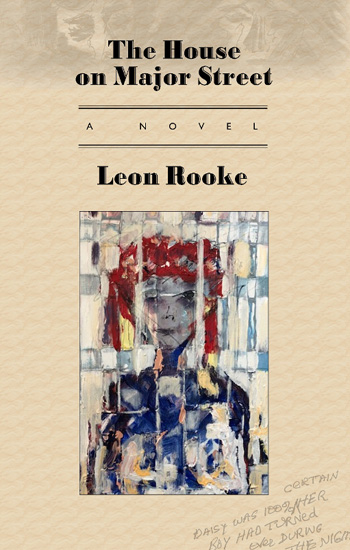 The House on Major Street
The House on Major Street
Porcupine’s Quill; (December 2018)
Populated by media personalities, literary characters, three-legged deer-like creatures and an array of idiosyncratic Toronto neighbours, The House on Major Street is an internal and external picaresque tale which begins with a dramatic bicycle accident and explores, along the way, the blurred boundaries between the stories we read, the stories we tell and the stories we live.
When free-spirited teenager Zan sets out on her bike to buy kitty litter at the local SuperSave one wintry day, she has no idea she’s about to send her neighbour and maybe-sort-of crush Tallis into a months-long coma, kicking off a series of events and conversations both real and surreal that will change everything and everyone on her Toronto Annex street.
Metafictional and meta-metafictional appearances are made by characters as diverse as J. J. O’Molloy, Chekhov’s Riabovitch, a rather infamous lapdog and the indignant Rebecca Whitehall, heroine of fictional Sheila Shott’s steamy romance novels. As these and other characters comment on and interact with the peculiarly ordinary inhabitants and neighbours of 2X8 Major Street, friendships, dalliances and alliances are formed and re-formed with some startling results. Politics and literary culture don’t come away unscathed. Through it all two questions overarch: Will Tallis ever wake up? And what will that mean for Zan?
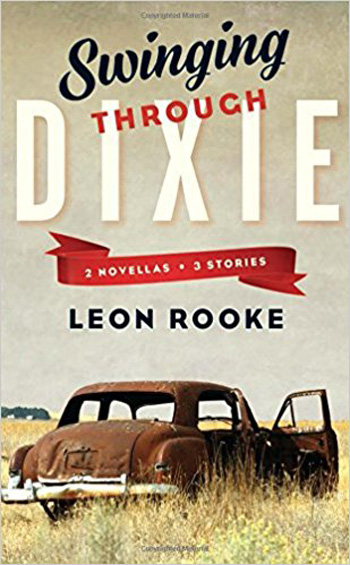 Swinging Through Dixie
Swinging Through Dixie
Biblioasis; (September 2016)
The three stories and two novellas gathered in Leon rooke’s Swinging Through Dixie fizz and pop with verbal play and emotional music. Parat comc Winesburg, Ohio, part Under Milk Wood, the title novella offers both an aural portrait of a small Southern town and a spiritual, deeply felt autobiography. The rest of the stories pluck strings Rooke has mastered over decades, skipping from realist to fabulist in a single note, his comic exaggerations urging you on to deeper understanding. Wondrously strange, peopled by pool sharks and hucksters and ethereal beauties and madmen, Swinging Through Dixie confirms its author as one of the most unique writers at work today, if only we would stop, relax and listen.
“[Rooke does] story-telling at its most compelling.”
~ Chicago Tribune“[Rooke] is simply not like any other writer out there. He’s a national treasure.”
~ The Globe & Mail“A writer whose talent… is large and whose voice, comparisons not-withstanding, is very much his own.”
~ The New York Times“Deliciously inventive.”
~ The Washington Post“Riveting… Rooke’s language is a riotous, tumultuous force of nature.”
~ Publishers Weekly
» » more @ Amazon.ca – click here
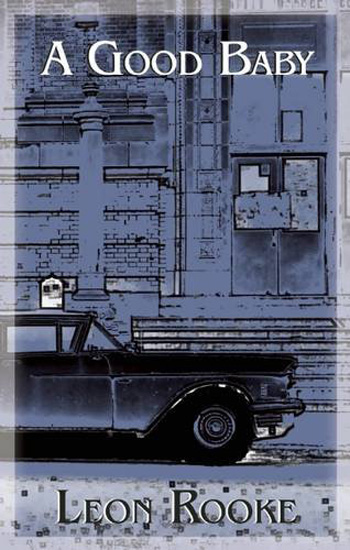 A Good Baby
A Good Baby
Biblioasis; 2nd Revised edition (Sept. 13 2016)
During the night of a storm, an Appalachian girl delivers a baby and disappears. The next morning, Raymond Toker finds the baby under a bush and takes to the mountain roads to find her a home. While Turner carries out his quest, the child’s father, Truman, with “teeth as rotten as his soul, ” drives his battered car along the same paths. Though critically acclaimed when first published by Knopf in 1990, and widely considered among Rooke’s best novels, A Good Baby has been unjustly forgotten. This beautiful new ReSet reissue brings attention to this fast, funny, frightening masterpiece.
“We’se all driven to the road taken… We’se all selected for that road without our agreement or connivance…” Thus Toker, a guileless, likeable sort, must share his road with an abandoned newborn, its murdered mother, a seductive woman, and a vile, “corpsy-eyed stranger” called Truman. Part allegory and part folktale, this Good-against-Evil story is reminiscent of Stephen King’s The Stand and of Manly Wade Wellman’s ” Silver John ” series. Written without quotation marks, in the language of the King James Bible and the dialect of some lost mountain cove, the book is fascinating but difficult to read. It will appeal to a limited audience. Rooke is the author of Fat Woman and Shakespeare’s Dog.”
~ Maurice Taylor, Brunswick Cty. Lib., Southport, N.C.
» » more @ Amazon.ca – click here
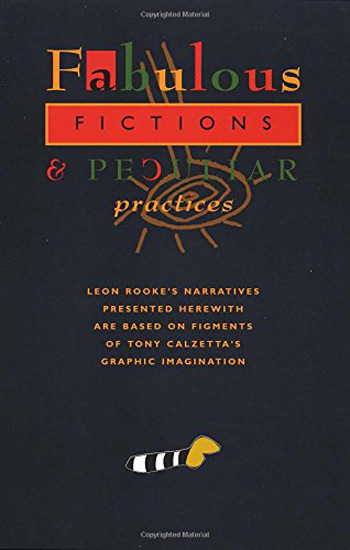 Fabulous Fictions & Peculiar Practices w/ Tony Calzetta
Fabulous Fictions & Peculiar Practices w/ Tony Calzetta
Porcupine’s Quill (April 30 2016)
Fabulous Fictions & Peculiar Practices is a fantastical literary experiment in which text and image come togethcollide to form an irreverent satire of society’s indifference to the artist.
“I think of Rooke and Calzetta as the Brother Grim and the Brother Grin. In their drawn and written incarnations, these fabulous fictions put on the degree of perversity and exuberance necessary to their telling. They are full of knowing innocence and an elusive jouissance. They occupy the terrain of the fairy tale, the allegory and the folk tale, all literary forms of deceptive simplicity.”
~ Robert Enright
» » more @ Amazon.ca – click here
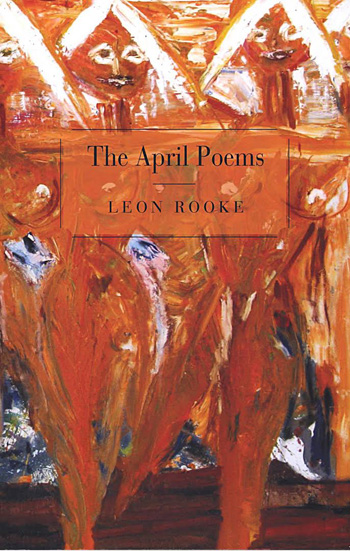 April Poems
April Poems
Porcupine’s Quill; First edition (March 15 2013)
In Leon Rooke’s imaginative, surreal world, it is always April.
In The April Poems, Leon Rooke bridges the gap between poetry and fiction with an array of poems that, while wildly experimental at times, form an overarching narrative about a woman named April.
The collection is a kind of fictional biography told through individual poems, a conceit worthy of housing a book’s worth of experimentation. It provides a structure in which Rooke’s blend of unique voices and magical realism can shine while keeping the larger perspective of the book in focus.
As the word “experimentation” implies, not all of Rooke’s efforts succeed. There are some longer works that veer a bit too far off the main path. Likewise, some of the short, one-note poems, such as “April’s Continuation of the James Tate Poem `Lewis and Clark Overheard in Conversation'” (a clever play on the original poem, which, as with Rooke’s continuation, consists solely of the line “then we’ll get us some wine and spare ribs”), may or may not catch a reader’s fancy.
That said, all of the far-ranging styles and techniques make the moments that hit home that much more effective, as in the glimpse into domestic life provided in “April’s Bad Husband Day”: “April and the children looking / chills raking the spine / knowing they knew him / from somewhere”
In “April’s Clunker Car,” an encounter with a tow-truck driver who confesses to having wished he’d married April years before gives rise to thoughts of what might have been: “Yup, well, here you go, he said, / pulling into a hustling hub, / next time you’re in trouble / breathe deeply and I’ll be on your bumper / like a hurricane.”
Unlikely as it is that every one of Rooke’s poems will hit the mark for individual readers, it’s just as unlikely that readers will not be amused, or moved, by any of them. Rooke is playful, but skilled enough to pull off most of what he attempts.
Rooke is known for experimentation, and for the distinct voices of his characters. He has received acclaim for many of his works, particularly his novel Shakespeare’s Dog, which has also been staged as a play. Rooke has been invested into the Order of Canada, and has received many other awards and prizes, including the Gloria Vanderbilt Carter V. Cooper Fiction Award in 2012.
“The April Poems is a novel (pun intended) way of telling a story–episodic, disjointed at times, full of imagery and surrealism. It is a grand experiment, one that readers are encouraged to assist in conducting, and one that many will find successful.”
~ Peter Dabbene
» » more @ Amazon.ca – click here
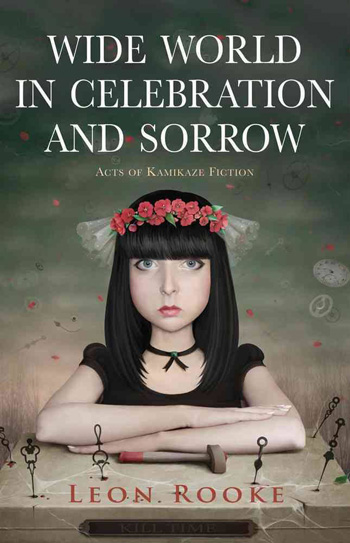 Wide World
Wide World
Exile Editions; 1st Edition edition (Oct. 1 2012)
Subversive, edgy, and wildly entertaining, this short story collection is a unique encounter with fiction in Leon Rooke’s characteristic style as he peels back the skin of social convention and embraces the chaos of life with characters and themes as unpredictable as an assassin who murders the words in your memory; Egi Balducchi who is either a recording angel or a mad old man with a wheelbarrow; Eli’s daughter, Frannie, who may just be a gentle two-bit hooker, or the Virgin herself; and is that really God, shrugging off insults from Isaac Babel and Guy de Maupassant? Then there is Lap the Dog who escapes gunshot and poison, and heads cross-country to find the human survivors; a glimpse into the life of Joyce Carol Oates; the philosopher Heidegger in a fight with Hannah Arendt; the Indian Chief who is denied his professorship at Yale when he turns up for the ceremony with a black princess on his arm; and more… Wide World in Celebration and Sorrow is an evocative short story collection that is wild with laughter, confronting pathos, rage and humour in ways that only Rooke’s writing could approach.
» » more @ Amazon.ca – click here
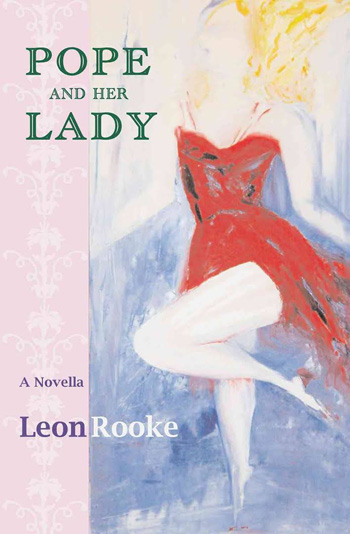 Pope and Her Lady: A Novella
Pope and Her Lady: A Novella
Exile Editions (Feb. 1 2011)
Presented in a stark dystopian setting, this extraordinary novella follows a lesbian couple on their journeys through the nightmarish reality of the disenfranchised. Peppered with Scottish slang and populated with a wide range of misfits, this book empowers the protagonists living on Glasgow’s grim streets and offers a strong feminist perspective.
“[Rooke] demonstrates that he is simply not like any other writer out there… Often, out of the darkest and most moribund situation, he wrestles a startling and uncanny beauty.”
~ Douglas Glover, Globe and Mail
» » more @ Amazon.ca – click here
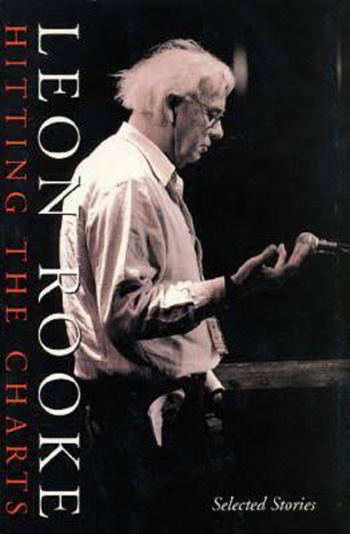 Hitting The Charts
Hitting The Charts
Biblioasis; 1st edition (Sept. 15 2006)
According to Russell Banks, North Carolina ex-pat Leon Rooke’s work charts “what the short story form can and cannot do, for he works out there in the terra incognita mapping limits.” Hitting the Charts, a nineteen story Best-Of compilation, offers stories as free from constraint as a Monk solo, and as disquieting and resonant as a southern Baptist preacher at a big-tent revival. Dancing is not forbidden.
“A delightful collection of some of this master entertainer’s work, Leon Rooke’s Hitting the Charts goes far in reminding us how deeply we can drink from an accomplished writer’s prose, how great the pleasure a good read can still deliver.”
~ The Globe and Mail
» » more @ Amazon.ca – click here
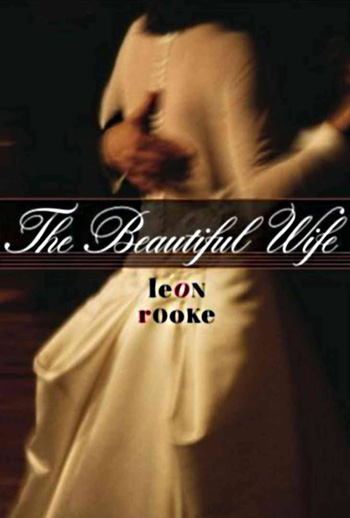 The Beautiful Wife: A Novel
The Beautiful Wife: A Novel
Thomas Allen Publishers; 1st Edition edition (Aug. 20 2005)
Viva Straight, a single woman who works for the Refugee Board of Canada, has set off with her mother for their annual holiday in the Dominican Republic when their plane is mysteriously diverted to the Philippines. There she meets and has a night of bliss with the enigmatic Monsieur Epee, who presents himself to her imagination as the ideal man – apart, perhaps, from the fact that he is possessed of a beautiful wife already.
So begins Leon Rooke’s exhilarating new novel populated by Viva’s extended family, numerous beautiful wives, seductive men, an unusual cat, Father Sin, the Sock People, the author himself and his researchers, a few ghosts, and even the shoe lady herself, Imelda Marcos.
The Beautiful Wife is an endearing marvel of narrative invention and narrative drive. It explores the quest for love and the mystery of attraction between men and women, celebrating links between art and politics and romantic love. It demonstrates, as well, the miraculous pull of myth and the pure necessity of ideals. Hailed as a national treasure, Leon Rooke is a master conjurer for whom grief, love and laughter are essential ingredients, profoundly mixed. The Beautiful Wife is fresh proof of Rooke’s own astonishing imagination and the power of love.
» » more @ Amazon.ca – click here
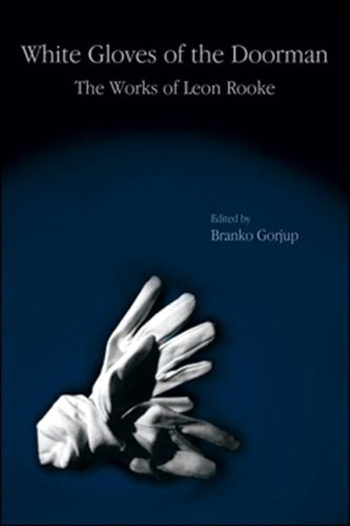 White Gloves of the Doorman: The Works of Leon Rooke
White Gloves of the Doorman: The Works of Leon Rooke
Exile Editions (Nov. 1 2004)
Leon Rooke’s body of work, six novels and seventeen story collections, undergoes cross-examination in Branko Gorjup’s fastidious and idiosyncratic retrospective, White Gloves of the Doorman. Rooke’s oeuvre, which many have found impossible to describe, is finely (finally) mapped. Along with the broader how-does-it-work type of questions, Gorjup asks what has weighed down Rooke’s advancement into Can Lit’s hall of fame. White Gloves poses the question and remedy in one-here is a volume of sincere, recuperative criticism.
Twenty-seven Rooke-lovers in all-novelists, poets, academics-are culled by Gorjup, who seems determined to appraise Rooke as though he were a many-sided sculpture; he walks us all the way around. Not surprisingly, the novelists and poets who appear in White Gloves present far more pleasurable (and not less intelligent) vantage points than their academic cohorts. Russell Banks, M.A.C. Farrant and Anne Michaels all seduce. Perhaps it takes an artist to properly love an artist-and White Gloves is an act of love.
We are led around this Leon Rooke, examining him through interview, review, scholarly critique, and gushing personal reminiscence. It’s an eerie experience, wading through 400 pages on a man so known for his own voice: how bizarre now to hear others talking back.
» » more @ Amazon.ca – click here
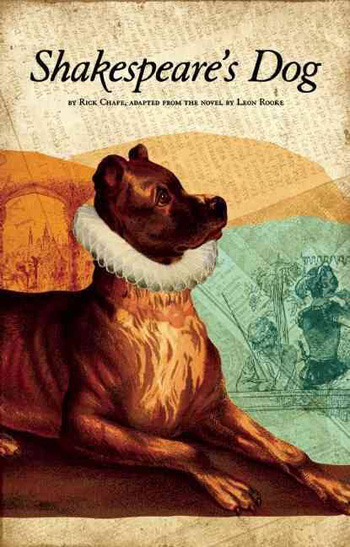 Shakespeare’s Dog
Shakespeare’s Dog
Thomas Allen Publishers (Aug. 4 2003)
A tour de force of inventive wit Shakespeare’s Dog is the eccentric and high-spirited story of William Shakespeare and how he came to bed and wed Anne Hathaway. Told from the point of view of the Bard’s dog, this astonishing novel of comic bliss, hailed as a triumph of language and an amusing delight.
A veritable find, a novel to thoroughly delight and amuse the most jaded of readers…it is lickerish, witty and full of panache.
~ Publishers WeeklyA rollicking comic novel… a triumph of characterization and language
~ Toronto StarShakespeare’s Dog is a breakthrough book. It’s marvellously inventive, full of juicy delights
~ Globe and MailThe most idiosyncratic and diverting of biographies of a man whose life stays shrouded in a lost quotidian… Leon Rooke’s capacity for unusual kinds of empathy was already amply demonstrated in his last novel, Fat Woman. In Shakespeare’s Dog he’s put his talent to the test and passed triumphantly… a robust delight
~ Harper’sExuberant… a triumph.
~ Maclean’s
» » more @ Amazon.ca – click here
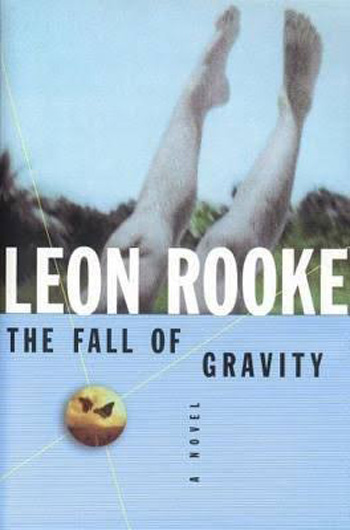 Fall of Gravity
Fall of Gravity
Thomas Allen Publishers; 1st Edition edition (Aug. 4 2000)
From a master conjurer of fictional invention comes an irresistible high octane road novel that propels the reader through breathtakingly original landscape replete with unforgettable characters and extraordinary adventures. Raoul Daggle is desperately searching for his disappearing wife on the lam. She has been sighted in a number of different states and provinces. Obsessed, he drives across the continent in his brand new Infiniti 2000 trying to track her down, all the while engaged in the most hilarious dialogue with his precocious ten-year-old daughter Juliette.
Meanwhile, his wife, Joyel Daggle, drives madly to escape them across the same landscape but in slightly altered time and space. Told with the inspired wit of a magus in love with a wicked world, this is a deeply affecting magical mystery tour of a dislocated psyche and one family’s passage through the dark night of the road into unexpected sunny uplands. Here is the critically acclaimed novelist and short-fiction writer Leon Rooke writing at his very best. The Fall of Gravity is a novel to make one whistle and sing with sheer joy of its infectious elan.
» » more @ Amazon.ca – click here
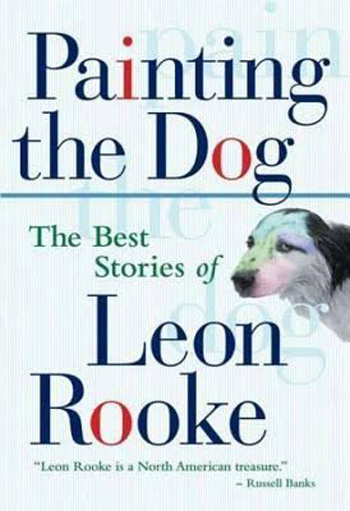 Painting The Dog
Painting The Dog
Thomas Allen Publishers (March 4 2001)
Leon Rooke is one of Canada’s preeminent fiction innovators, a master of the short form, and a literary godfather to scores of writers. Here, for the first time, is the quintessential selection of his best short fiction, culled from a prodigious career and 15 story collections.
In these beautiful affecting stories, both bittersweet and hilarious, Rooke mines the rich and often turbulent field of domestic life, of relationships between men and women, and of the fragile dislocations of young children. Included are classics such as The Birth Control King of Upper Volta, The Women’s Guide to Home Companionship, and Early Obscenities in the Life of the World’s Foremost Authority on Heidegger. Always fresh and original, these timeless stories push the boundaries of the traditional short story form.
Painting the Dog is vintage Rooke: 17 highly original tales brimming with whimsy and wit, pain and poignancy, and the author’s endlessly astonishing and electric imagination and riotous humour.
» » more @ Amazon.ca – click here
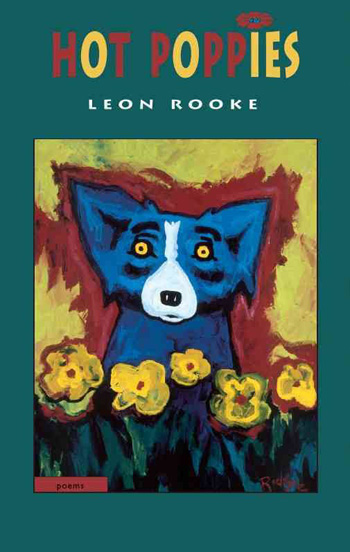 Hot Poppies
Hot Poppies
Thomas Allen Publishers; 1st Edition edition (Aug. 4 2000)
‘Everything from her mouth / I wrote down in a blue book.’
So begins Hot Poppies, a collection of poems by Leon Rooke, that grand master of the vocal jag and lyrical roar. Those who know Rooke’s fiction — the Governor General’s award-winning novel Shakespeare’s Dog, for example — will expect his first published poems to be rife with surreal flourishes, blazing language, sex, death, dogs and justice. All of these things are to be found in this blue book. So are Jasper Johns, (Lord) B, Princess Di, Lassie, Mahalia Jackson and John Cage.
Hot Poppies is a riotous, extravagant book, fresh from the hot-house, but it is also seductive and subversive. Five-line love lyrics, full of epigrammatic spark, intersperse vitriolic satires on American electoral antics. Britney Spears goes to war with the squirrels, `hefty as flying raccoons,’ and James Tate’s condemned man talks hurricanes and death row dinners with his warden. Rooke writes poetry with the glitter-seeking eye of a magpie, discovering unsettling beauties in his hoard of cultural detritus and post-millennial dread.
» » more @ Amazon.ca – click here
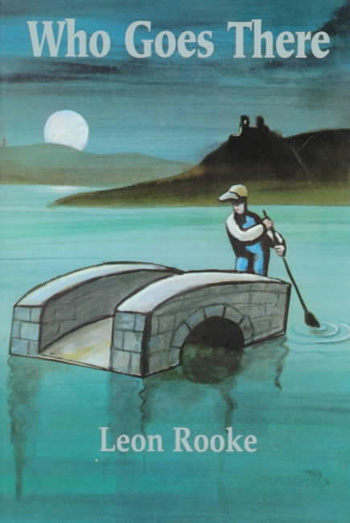 Who Goes There
Who Goes There
Exile Editions; 1st Edition edition (Nov. 1 1998)
A year before “Lewinsky” became a household name, Leon Rooke was at work on this novel about an aging right-wing southern senator’s shenanigans with interns; fraudulent Vietnam War heroes; and the real players in the Washington power playpen: the doorman at the Watergate, the local mafia don and his floozies, and the no-neck “spin-doctors” who “clean up” after the celebrities.
Hot Poppies is a riotous, extravagant book, fresh from the hot-house, but it is also seductive and subversive. Five-line love lyrics, full of epigrammatic spark, intersperse vitriolic satires on American electoral antics. Britney Spears goes to war with the squirrels, `hefty as flying raccoons,’ and James Tate’s condemned man talks hurricanes and death row dinners with his warden. Rooke writes poetry with the glitter-seeking eye of a magpie, discovering unsettling beauties in his hoard of cultural detritus and post-millennial dread.
» » more @ Amazon.ca – click here
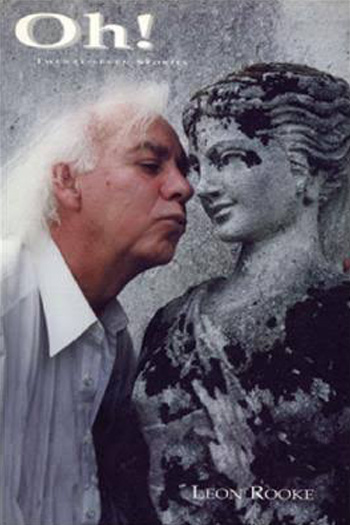 Oh!
Oh!
Exile Editions; 1st Edition edition (Nov. 1 1997)
In his first short story collection in five years, Leon Rooke brings together an extraordinary array of documents from diverse hot spots around the world. In an attempt to answer the question What is art?, the stories explore Italian “art,” Mexican “art,” Gypsy “art,” Native “art,” and political “art.”
» » more @ Amazon.ca – click here
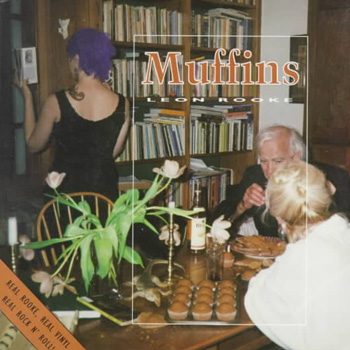 Muffins
Muffins
Porcupine’s Quill (Aug. 30 1995)
`Muffins is a square; it has a vinyl cover of a photograph of Rooke and his wife and another woman (their daughter?). The photograph-cover, if one “reads” it closely, shows the daughter reading a book; her back is facing her parents who are at a table eating — or about to eat — muffins. There is a book case stuffed with books “arranged” in a messy way. The photograph has in the middle a rectangle in white lines and the words in different typefaces (and colours): Muffins and Leon Rooke under Muffins. The effect is startling because I see photographs of books within the book itself. And I am thus aware that there is a carefully designed book-within-the-book. And I start thinking about the relation of the various elements I have mentioned. Is the cover the beginning of the book? Does it, on the contrary, tell a secret story? I see, finally, that I as reader or viewer must interpret the relations, must join — or create — the performance of interpretation. In a sense, then, I am writing a review of the photograph of the author. And I have not yet opened Muffins! My consciousness is whirling!’
» » more @ Amazon.ca – click here
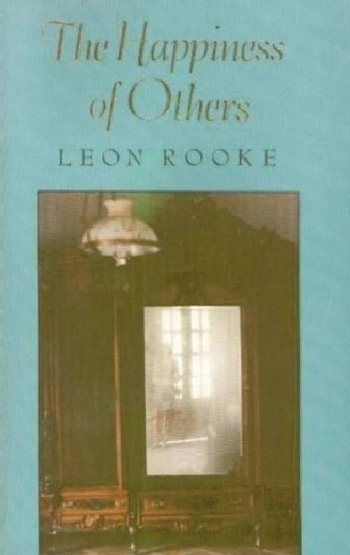 Happiness Of Others
Happiness Of Others
Porcupine’s Quill; 1st Edition edition (Aug. 30 1991)
The Happiness of Others brings together the best stories from Rooke’s first two books published in Canada, The Love Parlour (Oberon, 1977) and Cry Evil (Oberon, 1980), both now out of print, with a selection of stories from The Broad Back of the Angel (Fiction Collective, 1977) which was never available in this country.
At the centre of this collection is the novella `The Street of Moons’, which, as Rooke writes in the introduction, `takes as its point of departure from that particularly American, particularly nasty sensibility which regards all countries, especially Latin-American ones, as adjuncts of their own property, and their people as second-class citizens who ought to be speaking English.’ And as Russell Banks comments, `It’s when he’s funny … which he often is, that he’s at his most dangerous…. He’s a writer with a voice so sharp and personal that he changes your life while you’re busy laughing at it.’
`Leon Rooke’s novels are wondrous enough for anyone’s taste, but his stories are wondrous strange. In the last two decades his literally hundreds of stories have made him into one of the very few writers the rest of us have to read in order to know what the short story form can and cannot do, for he works way out there in terra incognita mapping limits. Beyond this, he can break your heart in half all at once, like a kindly assassin, or chop it to bits with a dozen swift, sure strokes. He’s a writer with a black belt in portraying the small daily tragedies that break bones and leave no visible wounds. It’s when he’s funny, however, which he often is, that he’s most dangerous. Like Stanley Elkin and Donald Barthelme, he’s a writer with a voice so sharp and personal that he changes your life while you’re busy laughing at it.’
~ Russell Banks
» » more @ Amazon.ca – click here
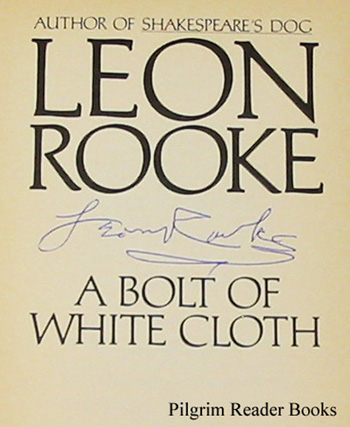 A Bolt Of White Cloth
A Bolt Of White Cloth
Stoddart (1984)
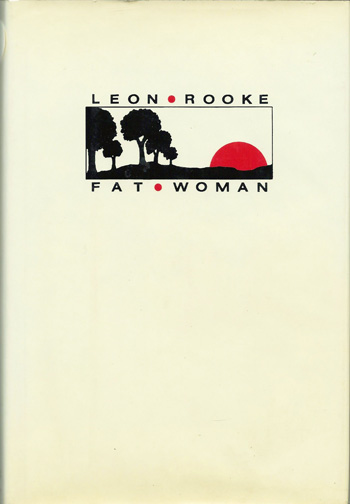 Fat Woman
Fat Woman
Random House Inc (T) (April 1981)
Obese Ella May Hopkins is a town joke, and even her husband and sons make fun of her weight. Nonetheless, Ella believes her family adores her. Fat Woman follows a day in Ella’s life and marks “Rooke’s extraordinary debut,” PW stated.
~ Publishers Weekly
» » more @ Amazon.ca – click here